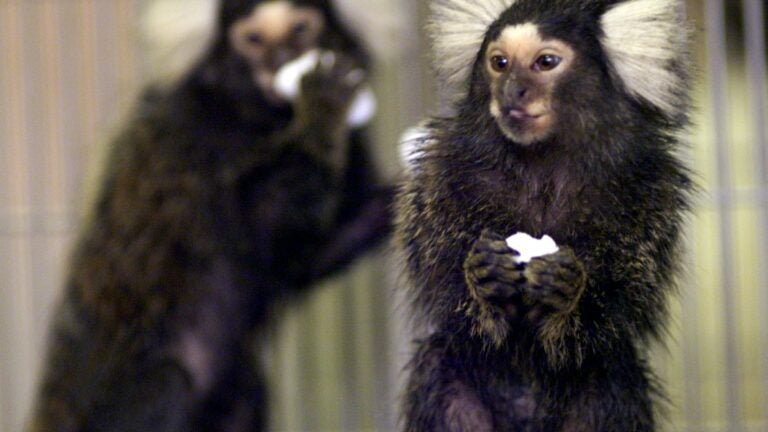Sign up for the Today newsletter
Get everything you need to know to start your day, delivered right to your inbox every morning.

The controversial monkey testing lab at UMass Amherst is closing after the lab in charge of the program decided not to seek further funding, citing federal cuts.
According to the Lacreuse Lab, led by Dr. Agnes Lacreuse, the researchers have been “studying the marmoset as a model for aging, Alzheimer’s disease and women’s health.”
“Current efforts to destroy science and slash research funding undermine my ability to provide continued support for nonhuman primate research at UMass,” Lacreuse wrote on the Lacreuse Lab website. “As we are completing a large study to help women with breast cancer live a better life, I have taken the decision to no longer seek funding to support a marmoset colony at UMass.”
The university noted that the lab’s closure will coincide with “the scheduled end of the grant.”
“The lab, whose work has been dedicated to studies that advance the knowledge of the aging process with a focus on Alzheimer’s disease and women’s health (including breast cancer treatments), recently completed NIH grant-funded research using non-human primates,” UMass Amherst wrote in a statement to Boston.com. “The funded experiments ended as planned.”
For the past four years, PETA (People for the Ethical Treatment of Animals) has advocated for the closure of the lab, alleging animal cruelty.
PETA criticized the lab over the procedures it reportedly performed on female marmoset monkeys to simulate and learn more about menopause, which marmosets do not experience naturally, they said.
“We were determined to close this laboratory and end the torture of these tiny monkeys and we did,” PETA Senior Vice President Kathy Guillermo said in the organization’s response to the lab’s closure. “Lacreuse’s reign of terror is over.”
According to PETA, lab scientists surgically removed the marmosets’s ovaries and then utilized hand warmers to simulate hot flashes. Additionally, PETA reported electrodes were put in the monkeys’s skulls through drilled holes, and then fed through an incision in the neck into the abdomen.
PETA wrote that videos from inside the lab should be released in the coming days.
Lacreuse, in her statement, wrote, “Above all, my heart goes to each one of the beloved monkeys who helped advance scientific knowledge and improve the lives of humans and other animals.”
In May, UMass Amherst released a statement on animal research that read, “Before embarking on a project, researchers must carefully consider and justify why there is no alternative to an animal model, how many animals are necessary to answer specific questions, and provide a detailed protocol for experiments for approval. Our researchers are committed to caring for animal models with the highest ethical standards and with rigorous compliance with all applicable federal and state laws and guidelines.”
The marmosets are cared for by a veterinarian who is overseen by Institutional Animal Care and Use Committee in accordance with a federal law, UMass wrote in the May statement. “Studies using animal models continue to play a crucial part in medical, veterinary, and scientific research that benefits both animals and humans,” UMass wrote.
In September 2021, Massachusetts native Casey Affleck held a press conference at UMass Amherst in support of PETA’s campaign to close the lab.
The Oscar-winning actor said at the press conference, “UMass can and should do better — end these hideous experiments on marmosets today. UMass, be the leader I know you to be.”
Oscar-winner, Massachusetts native, & animal rights champion Casey Affleck is standing up for sensitive marmosets tortured at @UMassAmherst! pic.twitter.com/D37HKaP0WN
— PETA (@peta) September 13, 2021
Editor’s note: This story has been updated to clarify the university’s position on the lab’s closure.
Get everything you need to know to start your day, delivered right to your inbox every morning.
Stay up to date with everything Boston. Receive the latest news and breaking updates, straight from our newsroom to your inbox.
Be civil. Be kind.
Read our full community guidelines.